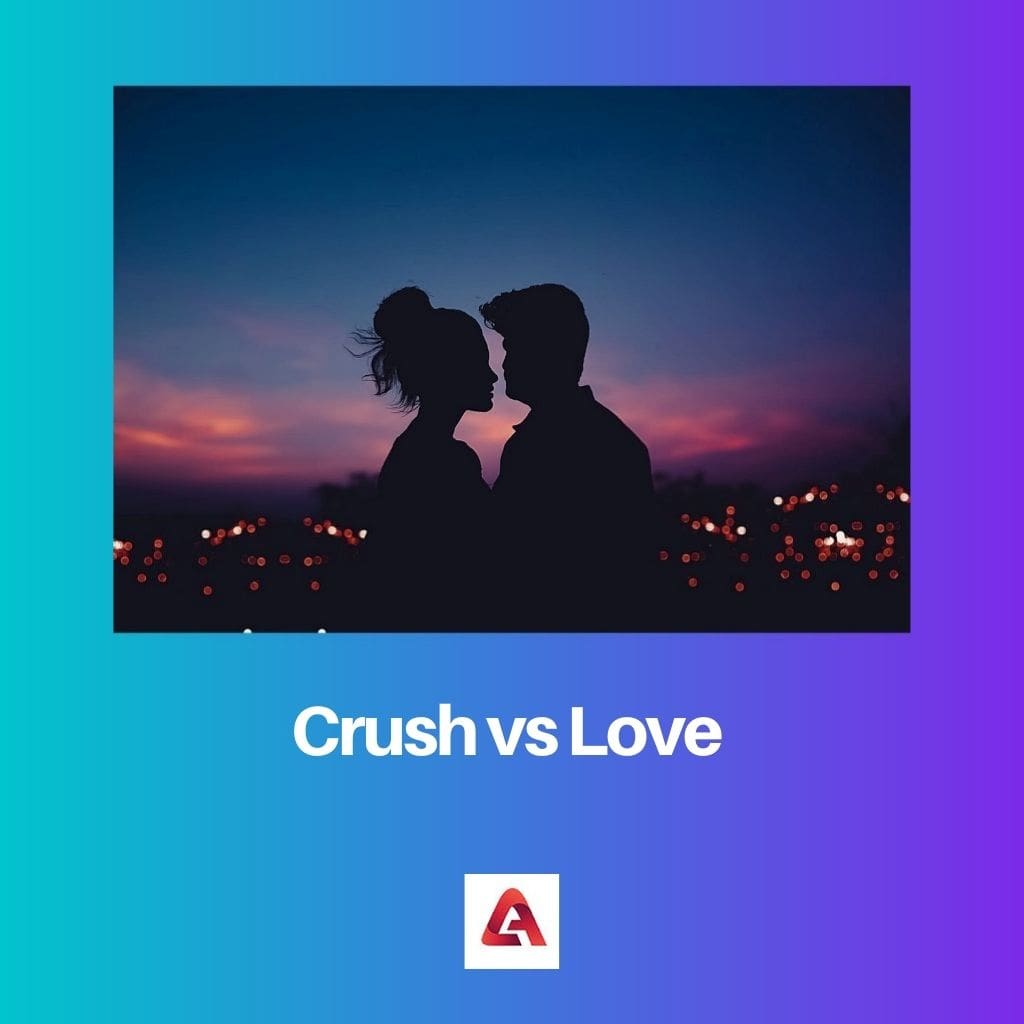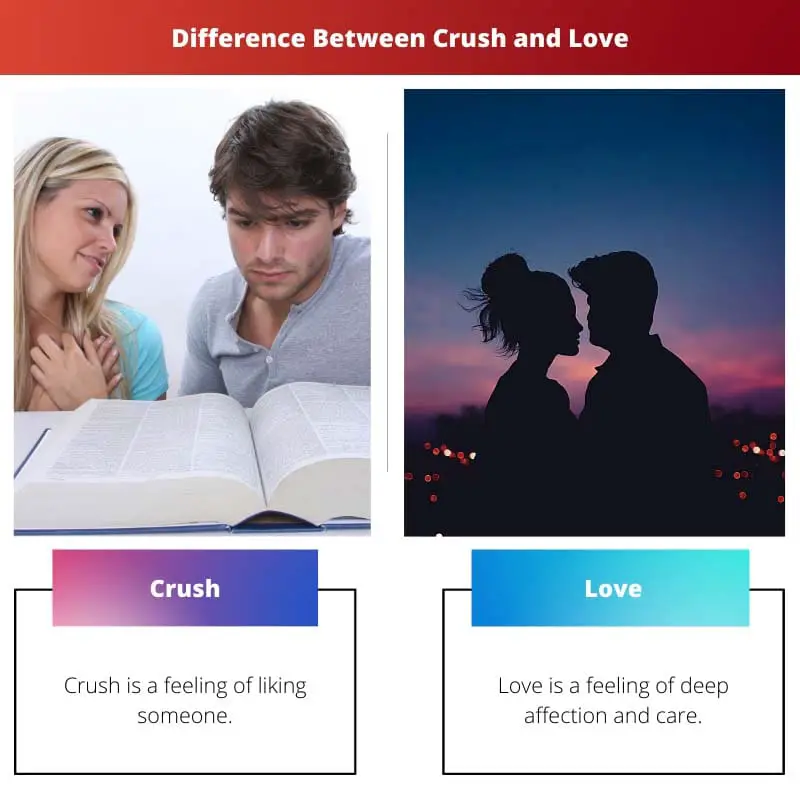A crush is like a fleeting spark, ignited by fascination and curiosity, often fleeting and shallow. Love, however, is a profound flame, rooted in understanding, acceptance, and deep emotional connection, enduring through the tests of time. While a crush may flicker in the shadows, love shines brightly, illuminating hearts with unwavering devotion and intimacy.
Key Takeaways
- Crushes are short-lived, intense feelings of admiration for someone; love is a deeper, long-lasting emotional connection.
- Crushes can be based on superficial qualities or physical attraction; love involves appreciating a person’s self, including their flaws.
- Crushes can evolve into love over time but may also fade; love requires time, effort, and mutual understanding to develop and maintain.
Crush vs Love
The difference between Crush and Love is that Crush is a temporary outwardly feeling that lasts for a short time, while Love is a deep intense feeling enduring for a lifetime.

However, the above is not the only difference. A comparison between both the terms on specific parameters can shed light on subtle aspects:
Comparison Table
| Feature | Crush | Love |
|---|---|---|
| Intensity | Infatuation, intense but often fleeting | Deeper, more enduring connection |
| Focus | Often based on physical attraction or idealization | Focuses on the other person’s whole self, including their flaws |
| Emotions | Excitement, nervousness, butterflies | Range of emotions – joy, comfort, respect, protectiveness, along with passion |
| Intimacy | Limited or superficial | Deeper emotional and physical intimacy |
| Investment | Less emotional investment | Greater emotional investment in the relationship |
| Selflessness | More self-centered, focused on what you get from the other person | More selfless, concerned with the other person’s well-being |
| Long-term | Tends to be short-lived | Aims for long-term commitment and growth |
| Decision-making | Often based on emotions and idealization | Decisions are based on reason, compatibility, and shared values |
What is Crush?
Characteristics of a Crush
- Infatuation: A crush is characterized by intense infatuation, where thoughts of the person dominate one’s mind, often leading to daydreaming and fantasizing about them.
- Butterflies in the Stomach: When encountering the crush, individuals might experience physical sensations such as increased heart rate, nervousness, or “butterflies” in the stomach.
- Idealization: During the crush phase, individuals tend to idealize the object of their affection, seeing them through rose-tinted glasses and overlooking potential flaws or shortcomings.
- Limited Interaction: Crushes often involve limited or superficial interaction with the person, leading to an exaggerated perception of their qualities and characteristics.
- Uncertainty: Since crushes are based on attraction and infatuation rather than deep emotional connection, there’s often uncertainty about the other person’s feelings or compatibility.
Duration and Evolution
- Short-Term Nature: Crushes are typically short-lived, lasting anywhere from a few days to several months. They can fade away gradually over time, especially if there’s no reciprocation or if individuals realize the object of their affection doesn’t meet their expectations.
- Potential for Growth: In some cases, crushes can evolve into deeper feelings or even develop into romantic relationships if both parties express mutual interest and compatibility.
Impact on Behavior
- Altered Behavior: Individuals often find themselves behaving differently around their crush, trying to impress them or seeking their attention.
- Social Media Stalking: With the prevalence of social media, it’s common for individuals to engage in “stalking” behavior, closely monitoring their crush’s online activity.
- Daydreaming and Fantasizing: Crushes can lead to extensive daydreaming and fantasizing about romantic scenarios involving the object of affection.
- Distraction: The presence of a crush can be distracting, making it difficult to focus on other tasks or responsibilities.
Coping with Crushes
- Acceptance: Acknowledging and accepting the presence of a crush can help individuals manage their feelings and prevent them from becoming overwhelming.
- Focus on Self-Improvement: Instead of obsessing over the crush, individuals can channel their energy into self-improvement and pursuing their own interests and goals.
- Communication: If appropriate and feasible, expressing feelings to the crush can provide closure and clarity, whether the outcome is reciprocation or rejection.
- Seeking Support: Talking to friends or trusted individuals about feelings towards the crush can provide perspective and emotional support.

What is Love?
Characteristics of Love
- Deep Emotional Connection: Love involves a deep emotional bond and connection with the other person, characterized by empathy, understanding, and acceptance.
- Unconditional Acceptance: True love involves accepting the other person for who they are, with all their strengths and weaknesses, without judgment or expectation of change.
- Mutual Respect and Trust: Love is built on a foundation of mutual respect, trust, and honesty. It involves being transparent with each other and having faith in the other person’s integrity.
- Commitment and Sacrifice: Love often entails a willingness to make sacrifices and compromises for the well-being and happiness of the other person. It involves prioritizing the relationship and making long-term commitments.
- Support and Empathy: In loving relationships, individuals support each other through both the joys and challenges of life. They show empathy and compassion towards each other’s feelings and experiences.
Types of Love
- Romantic Love: This type of love typically involves intense passion and desire, often accompanied by romantic gestures and physical affection.
- Familial Love: Familial love is the bond shared between family members, characterized by a deep sense of connection, loyalty, and support.
- Platonic Love: Platonic love refers to non-romantic affection and care between friends, characterized by mutual respect, trust, and emotional intimacy.
- Self-Love: Self-love involves having a positive regard for oneself, accepting one’s strengths and weaknesses, and prioritizing self-care and self-improvement.
Evolution and Growth of Love
- Development over Time: Love often evolves and deepens over time as individuals continue to nurture and invest in the relationship.
- Challenges and Growth: Facing challenges together can strengthen the bond of love, fostering resilience and growth both individually and as a couple.
- Stages of Love: Love can progress through different stages, from the initial infatuation and passion to a deeper, more mature bond characterized by companionship and mutual respect.
Impact of Love
- Enhanced Well-Being: Love has been linked to various physical and psychological benefits, including reduced stress, increased happiness, and improved overall well-being.
- Sense of Fulfillment: Loving relationships provide a sense of fulfillment and purpose, contributing to a greater sense of meaning and satisfaction in life.
- Increased Resilience: Love can provide a source of support and strength during difficult times, helping individuals cope with adversity and bounce back from challenges.
- Greater Life Satisfaction: Being in a loving relationship is associated with higher levels of life satisfaction and overall happiness.
Nurturing and Sustaining Love
- Communication: Open and honest communication is essential for nurturing and sustaining love, allowing individuals to express their feelings, needs, and concerns.
- Quality Time Together: Spending quality time together strengthens the bond of love, fostering intimacy and connection.
- Showing Appreciation: Expressing appreciation and gratitude for each other’s contributions and qualities reinforces feelings of love and admiration.
- Continued Growth and Development: Love requires ongoing effort and investment from both partners to continue growing and evolving over time.

Main Differences Between Crush and Love
- Nature:
- Crush: Characterized by infatuation and fleeting attraction.
- Love: Involves deep emotional connection, care, and commitment.
- Duration:
- Crush: Typically short-lived, lasting from a few days to several months.
- Love: Endures over time, often growing stronger with shared experiences and commitment.
- Depth of Feeling:
- Crush: Surface-level attraction often based on physical appearance or initial impressions.
- Love: Involves profound emotional attachment, acceptance, and mutual understanding.
- Behavioral Impact:
- Crush: Can lead to altered behavior, daydreaming, and distraction.
- Love: Promotes supportive actions, prioritization of the relationship, and mutual growth.
- Reciprocity:
- Crush: May or may not be reciprocated, leading to uncertainty.
- Love: Typically mutual, with both partners sharing deep affection and commitment.
- Longevity:
- Crush: Fades over time, especially if not reciprocated or pursued.
- Love: Endures through challenges and evolves, becoming stronger with time and shared experiences.

- https://www.ingentaconnect.com/content/sbp/sbp/2004/00000032/00000002/art00007
- https://dc.swosu.edu/cgi/viewcontent.cgi?article=2878&context=westview
- https://elibrary.ru/item.asp?id=6368964

The details mentioned about love are quite enlightening
It’s fascinating to know how feelings can be so complex
The post is not only informative but also thought-provoking in many ways
I’m glad to have come across this post. It offers a lot to reflect on
This is an excellent guide to understanding the complexities of human emotions
I never thought about love and crush from this perspective before. This is intriguing!
The tone of the post is very educational and insightful
Agreed. The post offers a fresh perspective on the topic
This post provides valuable insights to understand the nuances of emotions
Understanding the difference between the two concepts is essential in relationships
I truly appreciate the distinction between Love and Crush
Learning about the differences between the two is a real eye-opener.
The differentiation between crush and love is clearly articulated in this post
I’m impressed by the depth of analysis presented here
I find the explanation about the development of love to be quite thought-provoking
The post sheds light on various aspects that are overlooked in discussions about emotions
This post stresses the importance of patience and understanding in relationships
Indeed. The difference between crush and love is about emotional maturity
It’s refreshing to see such a mature perspective on this topic
The comparison table is an excellent way to understand the fine line between crush and love